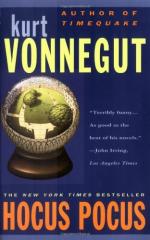|
This section contains 1,284 words (approx. 5 pages at 300 words per page) |

|
SOURCE: "Still Asking the Embarrassing Questions," in New York Times Book Review, September 9, 1990, p. 12
McInerney is an American novelist. In the following review, he discusses the balance between pessimism and humor in Vonnegut's novels, focusing on Hocus Pocus.
For purposes of comparison with our own stodgy, inherited universe, contemporary philosophers sometimes conjure up the concept of possible worlds. They've got nothing on Kurt Vonnegut, who in 12 previous novels has frequently resorted to other planets for slyly comparative purposes. But unlike most contemporary philosophers—who fastidiously restrict themselves to questions of linguistic and logical analysis—or most contemporary novelists, for that matter, Mr. Vonnegut is still asking the big, embarrassing, childish teleological questions. He is probably our leading literary big-question asker. He keeps posing the kind of questions, as he himself once put it, that college sophomores ask. Like, why are we on the planet? Or, why is there...
|
This section contains 1,284 words (approx. 5 pages at 300 words per page) |

|


